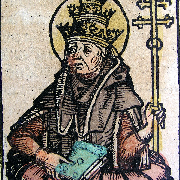|
Sleep of Bronze posted:As a bit of total speculation, I would suggest golden sword = sickle or some other sharp farm implement. I think he's actually trying to say that he thinks Demeter is Minoan, because of the labrys (whence our word "labyrinth"), which was associated with a goddess. It could well be something else (who knows?), but it's a normal Homeric word for "sword".
|
|
|
|

|
| # ? May 23, 2024 12:18 |
|
homullus posted:That translation is recent, but I don't really know why he translated it as "double axe" -- the Greek text I found said "golden sword". Doesn't really affect your reaction. She's not a violent deity in the Classical period, but she does get a lot of "lady in charge" epithets, so who knows what she was like in Dark Ages Greek religion. Plus the, y'know, sword thing. Didn't think she was violent, but the impression I had before this was a more passive goddess. The axe changes that somewhat.
|
|
|
|
euphronius posted:Also with so many many slaves, who needs prostitutes. IIRC it was actually illegal to rape slaves. Not that I imagine it didn't happen, of course, as sexual abuse goes hand in hand with economic exploitation. homullus posted:It wasn't just that he'd made fun of the mysteries -- it was also that he was accused of mutilating Athens' hermai, ruining their faces and chopping off their erections. Maybe not a capital crime today, but still kind of disturbing. Being accused of godlessness in ancient Athens was much like being called a Nazi/communist in today's America. It didn't matter if it was actually true, but it demonstrated that some people really, really wanted you gone because you'd gone past some imaginary line. homullus posted:I think he's actually trying to say that he thinks Demeter is Minoan, because of the labrys (whence our word "labyrinth"), which was associated with a goddess. It could well be something else (who knows?), but it's a normal Homeric word for "sword". It wouldn't be all that weird. Minoan religion apparently put a strong emphasis on fertility rituals, and Demeter is a fertility goddess, so.
|
|
|
|
Speaking of Greeks and Buddhism, can anybody post some knowledge about Central Asia of the time? Now it's famous for war, dust, poverty, drones, Taliban, wacky dictators, oddly shaped and unpronounceable former soviet -stans, human trafficking, Krokodil, Borat, maybe the only instance of humanity wiping an entire sea off the map and replacing it with toxic waste dustbowl, altogether one of the most miserable areas on earth outside of those jungles that contain ebola, and has been for decades now. But in the past it had the Silk Road, it had some of the biggest, wealthiest and most ancient cities in the world, geography out of high fantasy, it had mythical significance in various religions, was an integral part of some of the world's biggest empires, stomping ground of some of history's most legendary badasses, centers of scholarship in Islamic civilization, crossroads of Hellenistic, Iranian, Chinese, Indian, Tibetan, steppe nomad cultures. It's sad that it never seemed to inspire the imagination in the West like mythic Greece, or the Holy Land/Babylonia/Egypt, or feudal Japan, etc. and that now it's such a cruelly abused place for almost no reason. All I know comes from sparse Wikpedia pages which I suppose are OK for knowing rote facts but not much more. I'd love to read something better but I dunno where to look cos whenever I read the primary sources of some mythology or epic it's too impenetrable to be of much enjoyment to me but I am probably too much of a dilettante. I'd extend that request to Alexander the Great as well; reading about his various exploits is as crazy as mythical heroes, and he must have been totally aware of that of course, but they stayed generally inside the neighborhood of the Mediterranean as did the later legends/epics from Europe, it must have seemed like he was conquering his way through outer space and meeting alien planets. He's even a hero in the Quran(possibly)!
|
|
|
|
Athens didn't have an intricate legal investigation system, did it? I'd expect all Alcibiades could expect at a trial is his supporters arguing with his enemies until somebody gave in. Unless they somehow found a box of stone penises in his house or something.
|
|
|
|
SlothfulCobra posted:Athens didn't have an intricate legal investigation system, did it? I'd expect all Alcibiades could expect at a trial is his supporters arguing with his enemies until somebody gave in. I think they were big eyewitness testimony? I remember reading that a slave's testimony was not considered valid unless it was obtained through torture.
|
|
|
|
SlothfulCobra posted:Athens didn't have an intricate legal investigation system, did it? I'd expect all Alcibiades could expect at a trial is his supporters arguing with his enemies until somebody gave in. They didn't - investigation seems to have been a DIY kind of affair with some rudimentary laws to make it difficult to plant evidence. There were two sorts of accusations - dikai, which were suits where the victim was the litigant, and graphai, which were suits where the litigant wasn't the victim but was prosecuting someone on behalf of the community. This doesn't quite map onto our conception of civil and criminal law, since, for example, murder was a dikai situation since it was a crime against a particular family rather than a crime against the community. Mechanically, it's not exactly clear why this distinction was in play, other than evidence that if you brought a graphai suit before the court and failed to get at least one-fifth of the jury to vote to convict, you were subject to an enormous fine, around a thousand drachma, which would have been nearly two years' wages for an ordinary laborer. Athenian trials were exercises in crowd persuasion; juries were quite large, around two hundred people at the smallest, and both sides gave forensic speeches putting forth their version of the story, then there were allowances for cross-examination, heckling, and general tomfoolery. "Jury" is perhaps a misleading word, since our modern concept suggests careful deliberation and a disinterested consideration of only the facts -- Athenian juries were large, selected by random lots, and expected to be 'democratic' rather than impartial. There wasn't any voir dire or vetting jurors, so even if you were the defendant's closest friend or obviously biased, if your lot was drawn, you were on the jury. So in the case of Alcibiades, if he'd been brought to trial and the mood in Athens had generally been "gently caress that guy", he'd have been in danger even if the facts of the case were absurd.
|
|
|
|
sullat posted:I think they were big eyewitness testimony? I remember reading that a slave's testimony was not considered valid unless it was obtained through torture. Ancient law was about eyewitnesses and "character" plausibility -- were you the sort of person who would do what you're accused of, on top of "well, this citizen saw you do it, so..."
|
|
|
|
Imagine Morgan Freeman in Ancient Greece he would rule the globe
|
|
|
|
Tao Jones posted:They didn't - investigation seems to have been a DIY kind of affair with some rudimentary laws to make it difficult to plant evidence. There were two sorts of accusations - dikai, which were suits where the victim was the litigant, and graphai, which were suits where the litigant wasn't the victim but was prosecuting someone on behalf of the community. This doesn't quite map onto our conception of civil and criminal law, since, for example, murder was a dikai situation since it was a crime against a particular family rather than a crime against the community. Mechanically, it's not exactly clear why this distinction was in play, other than evidence that if you brought a graphai suit before the court and failed to get at least one-fifth of the jury to vote to convict, you were subject to an enormous fine, around a thousand drachma, which would have been nearly two years' wages for an ordinary laborer. It wasn't just that the mood was "gently caress that guy." They literally let him rile the whole city up and get a huge chunk of it raring and ready to go off to Sicily, let the expedition set off, and then sent a fast ship to show up and fetch him. So now the crowd most inclined to listen to him was all out of the city...
|
|
|
|
the JJ posted:It wasn't just that the mood was "gently caress that guy." They literally let him rile the whole city up and get a huge chunk of it raring and ready to go off to Sicily, let the expedition set off, and then sent a fast ship to show up and fetch him. So now the crowd most inclined to listen to him was all out of the city... Sounds like a Gerrymander trick. Get anyone who was likely to vote for him out of the way and then nail him. Politics never change.
|
|
|
|
The whole Alcibiades fiasco is one of the most hilarious incidents in history. Well, it probably wasn't hilarious for the people involved, but you get the point.
|
|
|
|
Does anyone know much about Sol Invictus/ the Sun cult? For a powerful, official religion I can't find too much information on how it actually worked and what was actually believed.
|
|
|
|
Are there post-Roman historical figures that can trace their lineage back to Romans? Like, I don't know, if the Komnenos family or Charlemagne's line was descended from Augustus or something?
|
|
|
|
Statistically, it's almost certain everyone in Italy and most people with a heritage from any country in the Roman world have some blue blood Roman in their background. I'm not aware of anyone that had a clear and documented lineage like that, though.
|
|
|
|
gradenko_2000 posted:Are there post-Roman historical figures that can trace their lineage back to Romans? Like, I don't know, if the Komnenos family or Charlemagne's line was descended from Augustus or something? The Julio-Claudian tree was not a fruitful one; Augustus had no male descendents. The Julio-Claudian dynasty continues through Tiberius, Augustus's step-son fathered by some random noble, and then Caligula, Claudius and Nero, ironically all descended from Mark Antony through the female line but not from Augustus. Arglebargle III fucked around with this message at 14:46 on Oct 26, 2013 |
|
|
|
The pythagorians: Whats the deal with them? Is there any information about the out there other than "Crazy math cultists who assasinated people to keep knowledge of irrational numbers from spreading?"
|
|
|
|
my dad posted:The whole Alcibiades fiasco is one of the most hilarious incidents in history. Well, it probably wasn't hilarious for the people involved, but you get the point. I think you can basically apply that to the entire life of Alcibiades. Dude's one of the most entertaining people in history for that reason.
|
|
|
|
What are some good examples of especially eccentric and entertaining ancient people? For example, I think it was this thread that turned me on to Diogenes the Cynic, a renowned philosopher who lived in a jug, hung out with his dog friends, peed on people, and was in every way indistinguishable from a modern day homeless person. Are there any other people that are on that level, or did they break the mold when they made him?
|
|
|
|
Can somebody explain Ancient Greek names? Do they have any meaning, are they just neat sounds strung together? And how does only having one name work? Like, that wiki link above says Diogenes of Sinope. If there's another Diogenes in Sinope, how do you keep it straight?
|
|
|
|
Pornographic Memory posted:Can somebody explain Ancient Greek names? Do they have any meaning, are they just neat sounds strung together? And how does only having one name work? Like, that wiki link above says Diogenes of Sinope. If there's another Diogenes in Sinope, how do you keep it straight? Between the Greeks with their one name, and the Romans with their three names, you can average them out and it starts to almost make sense to me.
|
|
|
|
Pornographic Memory posted:Can somebody explain Ancient Greek names? Do they have any meaning, are they just neat sounds strung together? quote:And how does only having one name work? Like, that wiki link above says Diogenes of Sinope. If there's another Diogenes in Sinope, how do you keep it straight?
|
|
|
|
Pornographic Memory posted:Can somebody explain Ancient Greek names? Do they have any meaning, are they just neat sounds strung together? And how does only having one name work? Like, that wiki link above says Diogenes of Sinope. If there's another Diogenes in Sinope, how do you keep it straight? Populations weren't as large back then though. Modern cities are really huge, but ancient ones would be severely straining the capacity of the land to feed them at even a fraction of modern sizes, without modern fertilizers, healthcare, transportation and food preservation. So with a second identifier like where they live, their job or the name of a parent, it should work. Oh right, on religions, what were the commonly speculated factors for their knowledge persisting to the modern age even though their actual practice died out before? I mean, a good bit of the Norse, Egyptian and Celtic myths persist well enough that even laypeople have a chance of knowing their major figures, but others just left little sign in the public memory, sometimes even in the lands of their native culture.
|
|
|
|
Pornographic Memory posted:Can somebody explain Ancient Greek names? Do they have any meaning, are they just neat sounds strung together? And how does only having one name work? Like, that wiki link above says Diogenes of Sinope. If there's another Diogenes in Sinope, how do you keep it straight?
|
|
|
|
Alekanderu posted:I don't think there are any names anywhere that are just sounds strung together, at least not in Western culture. All (proper) names that I know of mean something in some language, or are derived from names that mean something, ie John which (in the original Hebrew form of Yohanan) means "graced by Yahweh". Yeah, the main reason we think of modern western names as not having a meaning is that the original meanings are from languages that very few (if any) people speak anymore. In addition, most modern western names are so changed from the originals that even the native speakers of whatever language it cam from probably wouldn't recognize it.
|
|
|
|
Golden_Zucchini posted:Yeah, the main reason we think of modern western names as not having a meaning is that the original meanings are from languages that very few (if any) people speak anymore. In addition, most modern western names are so changed from the originals that even the native speakers of whatever language it cam from probably wouldn't recognize it. I think this is more true of Biblical names than others, filtered as they are through multiple languages by the time they get to us. I'd hypothesize that names at only one remove (Greek>English, Latin>English, German>English) linguistically, regardless of time passed, still hold up pretty well.
|
|
|
|
Suben posted:I think you can basically apply that to the entire life of Alcibiades. Dude's one of the most entertaining people in history for that reason. I think the best part is the time Sparta got hit with an earthquake and he was caught racing out of the Queen's bedchamber. Additional comedy; she had a son 9 months later... Of course, no one brought it up until Lysander wanted to put the original  on the throne so... may or may not be true. The Spartans were a little more okay with extramarital hanky-panky though. Where in most states marriage was an institution to prolong a family line, in Sparta it was an institution for producing more Spartans. Can't get it up? Suck it up Spartan. Find a young warrior you like and get him in bed with your wife. on the throne so... may or may not be true. The Spartans were a little more okay with extramarital hanky-panky though. Where in most states marriage was an institution to prolong a family line, in Sparta it was an institution for producing more Spartans. Can't get it up? Suck it up Spartan. Find a young warrior you like and get him in bed with your wife.
|
|
|
|
Sleep of Bronze posted:Patronymics mostly. Athens is actually remarkable because its citizens were supposed to refer to themselves by their democratic units (the demes) instead of their fathers. In the end we still tend to see stuff like "Socrates Sophroniscus' son", so whether that was fully adopted is under doubt. homullus posted:I think this is more true of Biblical names than others, filtered as they are through multiple languages by the time they get to us. I'd hypothesize that names at only one remove (Greek>English, Latin>English, German>English) linguistically, regardless of time passed, still hold up pretty well. This got me thinking, democracy is thought of as being first created by the Athenians, but didn't the Romans claim they came up with their Republic system first? I'm curious which came first.
|
|
|
|
Ainsley McTree posted:What are some good examples of especially eccentric and entertaining ancient people? For example, I think it was this thread that turned me on to Diogenes the Cynic, a renowned philosopher who lived in a jug, hung out with his dog friends, peed on people, and was in every way indistinguishable from a modern day homeless person. Not quite in answer to your question, but it's funny when you look at ancient Greek philosophies like Stoicism and Cynicism because the modern definition is either completely misunderstood (Stoicism) or completely and negatively misinterpreted (Cynicism). Oh, um, I suppose Nero is a good example of an eccentric and entertaining person. Except, of course, he could kill you if you laughed at him. Octy fucked around with this message at 23:13 on Oct 26, 2013 |
|
|
|
veekie posted:Populations weren't as large back then though. Modern cities are really huge, but ancient ones would be severely straining the capacity of the land to feed them at even a fraction of modern sizes, without modern fertilizers, healthcare, transportation and food preservation. So with a second identifier like where they live, their job or the name of a parent, it should work. What size were cities and too a lesser extent towns back then? I mean in terms of population, is it only the city that's grown or are hamlets a lot bigger now than they used to be? Probably should highlight that I'm viewing this from a UK perspective, so my view on even large city sizes is going to a scale smaller than any American counterparts. Basically in most large cities I'd expect a sub 500,000 figure with the obvious exception of the behemoth that is London. For further clarification my own city tops out at about 300,000. So ancient cities, how close do they come? And once the whole Rome civilisation started to develop how rapidly did the population of the city increase, if of course it increased at all?
|
|
|
|
Well here are some examples: The walled portion of Athens, covering about 3.5 square kilometers, had 140,000 people around 480 BC and the entire Athens city-state was up to 320,000 people in that and the surroundings. During the peak of the Roman empire around 200 AD, the city of Rome had 1 million people and the total territory controlled by Rome covered 60 million people.
|
|
|
|
UnquietDream posted:What size were cities and too a lesser extent towns back then? I mean in terms of population, is it only the city that's grown or are hamlets a lot bigger now than they used to be? Probably should highlight that I'm viewing this from a UK perspective, so my view on even large city sizes is going to a scale smaller than any American counterparts. Basically in most large cities I'd expect a sub 500,000 figure with the obvious exception of the behemoth that is London. For further clarification my own city tops out at about 300,000. So ancient cities, how close do they come? And once the whole Rome civilisation started to develop how rapidly did the population of the city increase, if of course it increased at all? It varies a lot, and the ancient world has periods of intense urbanization. The ancient ancient Bronze Age world had huge cities, then there was a collapse into smaller ones, then the classical world had big ones again. I believe Athens was the largest Greek city, and its population got up to a few hundred thousand. Rome was the largest city in the world for a while with a population of over a million. Constantinople was of similar scale, and places like Antioch and Alexandria were also huge, probably approaching a million. These were the biggest cities. A more normal big city would be Pompeii, which had a population of 60 or 70,000. Your average town was probably more like 20,000. In the classical Roman world if you want to break down into tiers. The very biggest cities would range close to a million, there are only a few of these. The big cities would have a few hundred thousand. Major urban centers just below that would be 50-100,000. And your average towns in the 10-20,000 range. So medieval cities are a big change, when 20,000 becomes a quite large city. In most of Europe, that is--Italy maintains huge cities by medieval standards, as does the Roman Empire and much of the Islamic world. Grand Fromage fucked around with this message at 02:54 on Oct 27, 2013 |
|
|
|
Rome itself was very big even by modern standards, at about one million people. Constantinople probably (?) matched it eventually. The major metropolities (especially in the east) would range in the couple hundred thousand residents. Modern people would definitely recognize cities during the height of the Empire as "cities", and the urban topography is much more relatable than say, the typical city in western Europe during the Middle Ages. I don't really know what Romans would consider towns and on average the population would be, but I'm guessing it'd scale pretty similarly to what we're used to. edit: beaten, nevermind edit edit: The comment about UK cities had got me thinking though, as the city I went to for undergrad I had considered at the time "small" at 500,000 only to find out it's like, the 33rd largest city in all of the United States  . I don't think I could cut it in a state like Maine where the largest city is like, 70,000 people. . I don't think I could cut it in a state like Maine where the largest city is like, 70,000 people.
Berke Negri fucked around with this message at 03:01 on Oct 27, 2013 |
|
|
|
SlothSpot posted:Wasn't that applied just as they came up with democracy? The honeymoon probably ended after the first generation when democracy became the norm. Yeah, it was more about the demes being totally new. Basically, the Athenians were split up into sort of regional units. Neighborhoods, villages, what have you, but this led to a lot of factionalism. 'Rural' tribes didn't like 'fishermen' tribes didn't like... blah blah blah. The new units were cut up across much more diverse socio-ethnic lines. Sort of... reverse gerrymandering, so that there was more loyalty to the whole state, not just your corner of it. A democracy and a republic are different. Rome was more of an aristocratic oligarchy, which there were plenty of. Athens wasn't totally unprecedented either.
|
|
|
|
Grand Fromage posted:
Great time to post the whole medieval city of Arles fitting in its Roman amphitheater. 
|
|
|
|
Though it's worth keeping in mind that the population of a million people in one city is more or less held up by the resources of the empire, whereas in the modern world, even a small country would be likely to have one or two urban centers of a million people.
|
|
|
|
Wow that Arles picture is cool, I never knew about that. Somehow they fit 200 houses inside that amphitheater.veekie posted:Though it's worth keeping in mind that the population of a million people in one city is more or less held up by the resources of the empire, whereas in the modern world, even a small country would be likely to have one or two urban centers of a million people. Yep. Rome was supported by massive food shipments from Egypt and Sicily. It was completely unable to sustain itself, which is why its population collapsed so hard after the empire fragmented. Italy in general was unsustainable. Sicily was basically one giant farm to feed it, and Egypt's huge surplus of grain fed many more.
|
|
|
|
I guess it all goes back to the Romans great strength as a military force. The power of logistics.
|
|
|
|
veekie posted:Though it's worth keeping in mind that the population of a million people in one city is more or less held up by the resources of the empire, whereas in the modern world, even a small country would be likely to have one or two urban centers of a million people. That's not too different from now. I mean, a major city like a capitol or primary trade city for any given country could hit a million, but this is still largely due to technology, trade, logistics, infrastructure. A city like New York at its current (non-metro?) pop of like ten million or whatever is 100% unsustainable without international (and inter-state) trade, roads, etc. This is why the West falls apart pretty quickly and Rome depopulates, but you still see the East keep on trucking with fairly large cities (Constantinople and Baghdad were some of the largest cities around during the Middle Ages at the 1,000,000+ pop point) The west really becomes a shithole (though not in ways we popularly think of). IIRC, Crusaders first rolling into the East were kind of shocked at what the cities were like, and Conquistadors were even blown away by Tenochtitlan even though it was only a city of like 200-300,000 people. Paris, at the time, I think was what, a third of that? A lot of Muslim cities would easily be around that if not more.
|
|
|
|

|
| # ? May 23, 2024 12:18 |
|
True, modern cities have logistics as a matter of course that the ancients would need an empire to supply just one city for, but modern food production is also very much more intensive due to industrial scale agriculture. Meat and grain produced aggressively and harvested mechanically cuts down on the labor investment per food unit. Refrigeration lets perishable foodstuff last longer and motorized transport, not to mention shiploads of cargo, gets the stuff there faster. However, these aren't exactly supplied by a central authority like they would have required in ancient times. Locally, enough food is produced in a country to feed a capital city with a population of a million. Heck, even North Korea, in a famine situation and in a sticky trade situation, can crawl along with a capital city population in the millions.
|
|
|





























